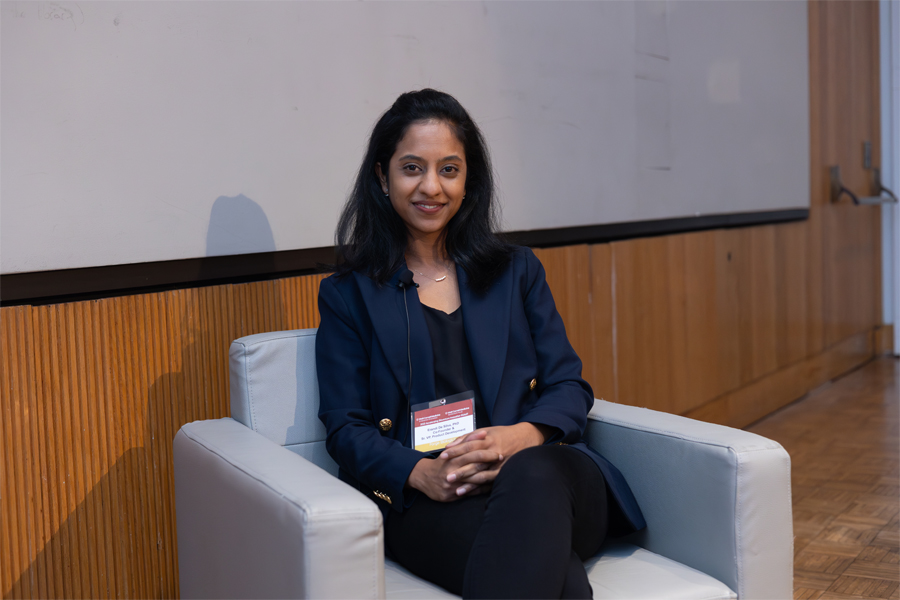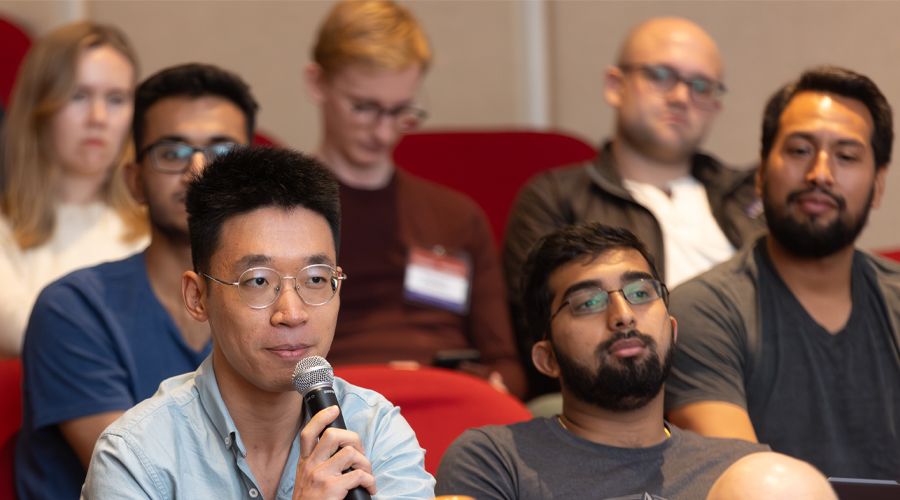
An Accelerating BioVenture Innovation (ABI) student asked Dr. Erandi De Silva, the guest speaker of the Fall 2023 cohort kickoff event hosted on Aug. 29 in a packed Uris Auditorium, how she was able to convince venture capitalists with an idea of gene therapy development and operationalization on paper.
In answering the question, Dr. De Silva, co-founder and senior vice president of product development at Forge Biologics, Inc. (“Forge”), a biotechnology company focused on adeno-associated virus (AAV) viral vector manufacturing and gene therapy, reflected on obtaining Forge’s first round of financing.
“Early on in the fundraising journey, one of the things that helped was warm introductions,” she said. “You get those warm introductions by networking with other entrepreneurs or venture capital firms so that they look at things that you're pitching.”
Dr. De Silva was invited to speak to ABI students and the extended Weill Cornell Medicine community by Loren Busby, director of BioVenture eLab. In the experiential ABI course, Busby and a group of experienced industry practitioners teach startup basics to graduate students and postdoctoral trainees seeking to learn more about the commercialization process for academic inventions.
Dr. De Silva noted that a compelling pitch to investors requires good story telling complemented with the right team of individuals, which meant a team with expertise in manufacturing, gene therapy development and fundraising in her case, as well as concrete plans in place. She also noted that it’s important for a scientist trying to become an entrepreneur to have a can-do attitude and pressure test the system to get traction and move forward.
Although some investors were skeptical that her company could build in the Midwest and develop so quickly, Dr. De Silva turned that into reality. She said she is positive that Forge is filling a unique niche and will be self-sustaining with its current business model.
Her transition from academia to entrepreneurship is an engaging story to share in itself. Inspired by epidemiologists and doctors working on the HIV public health crisis when she grew up in Botswana, Dr. De Silva studied in California for her undergraduate degree hoping to become a scientist. Then, she moved to the East Coast to pursue her doctorate in infectious disease and conducted research in molecular biology. Little did she know at the time that she would land in Columbus, Ohio, building a biotech company and becoming a pioneer of what is now an ecosystem of gene therapy companies.
She had always wanted to work in translational biotech to make an impact. By doing a postdoctoral fellowship at Genentech, Dr. De Silva learned how to work with an interdisciplinary team of colleagues to decide on a path forward and execute on milestones in industry. She was exposed to the complexity of product development. Later, her job at the Drug Development Institute, a translational incubator at Ohio State University, allowed her to interact with fellow scientists, entrepreneurs in the area and venture capitalists, which resulted in the encounter with one of her co-founders.
Dr. De Silva and her co-founders built Forge as a contract development and manufacturing organization, or CDMO, with the strategy to sell manufacturing services for revenue and use that revenue to fund a proprietary therapeutics pipeline. A little over three years after its formation, Forge now has over 300 employees, two proprietary assets in their pipeline, and has raised $330 million. In what she characterizes as a “bold move,” prior to closing their Series B round, the founders leased a 200,000-square-foot building as their new manufacturing facility. It is actively seeking collaborations with technology transfer offices and looking at next generation gene therapy technology, such as a combination of AAV with lipid nanoparticle technology.

An attendee asking Dr. De Silva questions
Reminiscing on the learning experience, Dr. De Silva advised ABI participants to adapt to a different style of communication. Aspiring entrepreneurs, she said, need to be less data-driven when talking to investors. “You have to be able to take the 50,000-foot level talk and weave it into a story and a vision for what you want to do, but be convincing because that needs to be backed up with facts, or at least a plan,” she said, “I think that is an area where we don't have a lot of training as scientists, and that really does come from being on the job.”
In addition, Dr. De Silva elaborated on the difference between early fundraising and later fundraising for a startup. While early fundraising is selling a vision, later stage fundraising, such as Series B and C, requires an entrepreneur to demonstrate successful operationalization and execution on that vision.
Dr. De Silva’s talk sparked a lot of interest and questions in the audience. They asked for more details in the process of her startup formation, her expansion plan for Forge and future developments in the gene therapy space.

